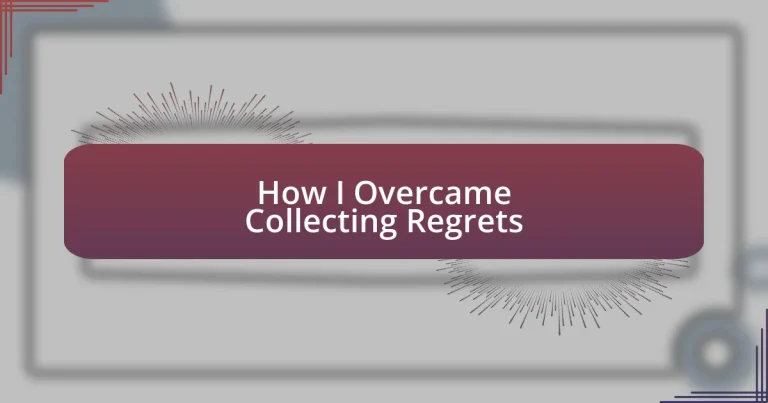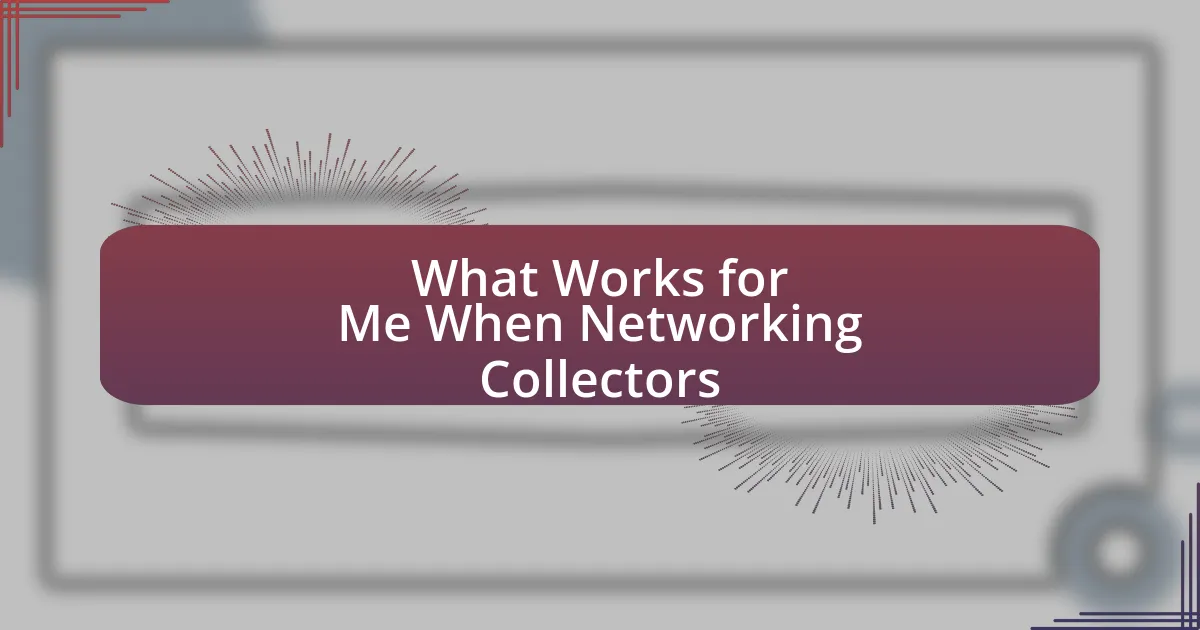Key takeaways:
- Regrets often reveal our values and priorities, serving as important milestones for personal growth.
- Acknowledging and listing regrets can provide clarity and help identify patterns for future behavior.
- Strategies such as self-compassion, focusing on the present, and seeking support help transform regret into motivation.
- Embracing forgiveness and acceptance fosters resilience and allows for a positive re-framing of past experiences.
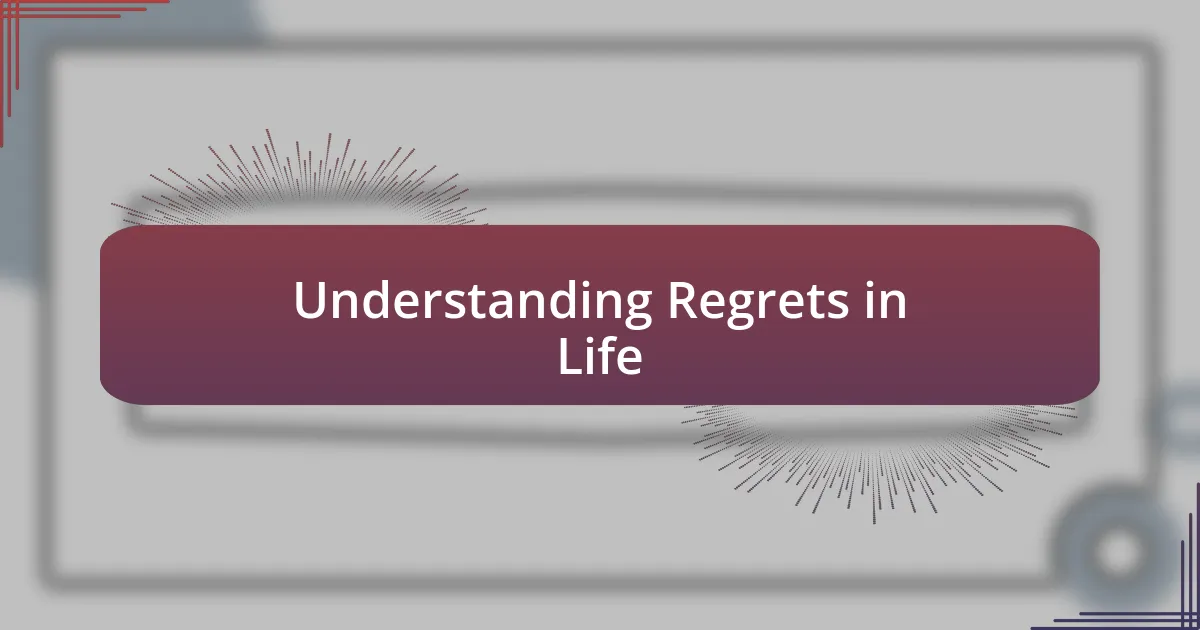
Understanding Regrets in Life
Regrets are often more than just missed opportunities; they carry emotional weight that can linger for years. I remember a time when I chose to prioritize work over a family gathering, thinking there would be more chances to connect later. That decision still weighs on me when I think about the moments I let slip away, prompting me to wonder: how many of these choices do I make without fully recognizing their potential impact?
Understanding regrets requires looking inward and reflecting on what those feelings reveal about ourselves. I once thought that regret was merely a sign of weakness, but I’ve learned it’s also a powerful teacher. It leads me to ask: what do my regrets say about my values and priorities? Embracing this perspective shifted my view, helping me see each regret as a milestone in my personal growth journey.
Ultimately, our regrets can illuminate the areas in life where we seek fulfillment. I’ve found that contemplating my regrets gives me clarity about my life’s direction. For instance, revisiting my past decisions regarding relationships has shaped how I interact with loved ones today. Isn’t it fascinating how acknowledging what we wish we had done differently can guide us toward making those crucial changes moving forward?
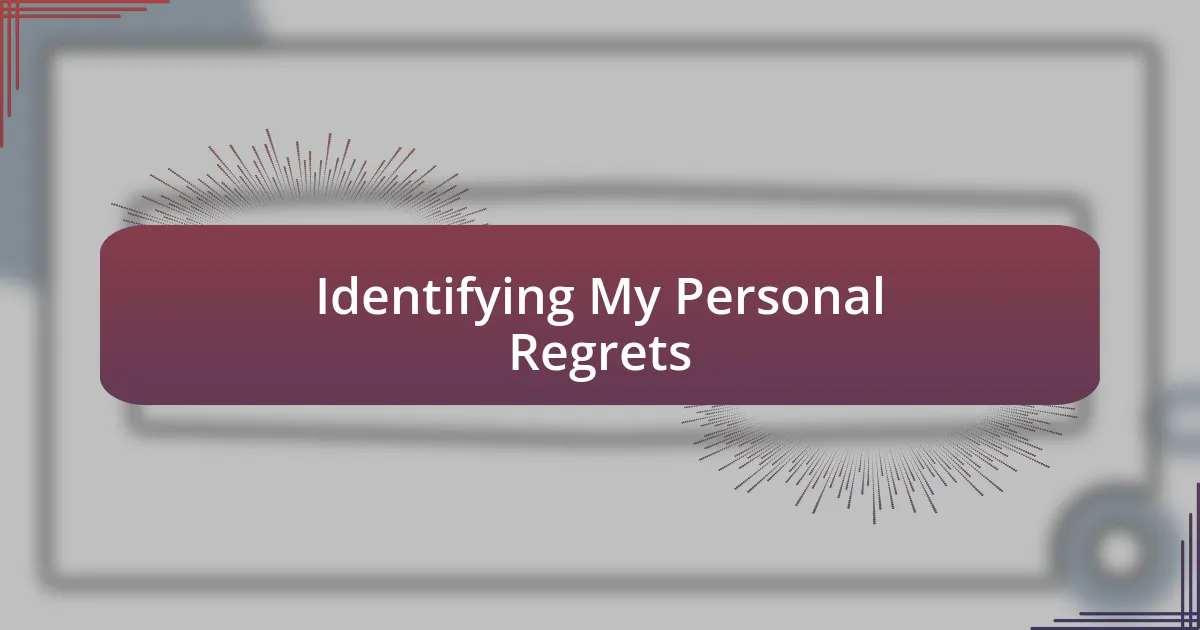
Identifying My Personal Regrets
Identifying personal regrets starts with honest self-reflection. I recall a period in my life when I was so focused on academic success that I missed opportunities to nurture important friendships. Each time I think back to those days, I wish I had invested more time in those relationships instead of solely chasing grades. Does that resonate with you? It certainly made me realize the true cost of my decisions.
As I delved deeper into my regrets, I recognized patterns of behavior that often led to missed chances or unfulfilled desires. For example, hesitating to express my feelings in a crucial friendship ultimately left a void that lingered for years. It was surprising to see how these regrets weren’t just about the choices I made, but also about the courage I lacked at the time to pursue my heart’s desires. This revelation sparked a commitment to identify situations where I could be more authentic moving forward.
I also found it helpful to list my regrets, which made them more tangible. Writing them down highlighted recurring themes in my life—such as avoiding discomfort or fearing failure. The act of listing transformed my regrets from vague feelings into concrete experiences. This process not only brought clarity but also encouraged a deeper understanding of what I want to prioritize in my life now. What about you? Have you thought about what your regrets reveal about your core values?
| Regret Type | Emotional Insight |
|---|---|
| Friendships | A missed opportunity to connect led to loneliness. |
| Career Choices | Prioritizing advancement over fulfillment created ongoing dissatisfaction. |
| Personal Expression | Holding back feelings resulted in lost relationships and regret. |
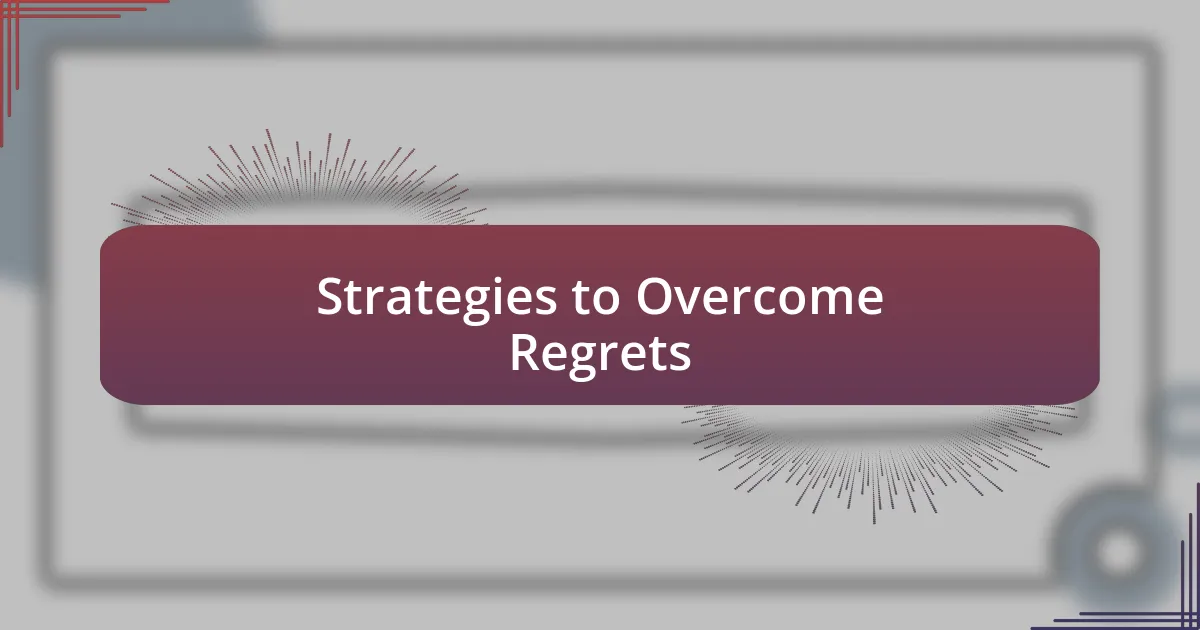
Strategies to Overcome Regrets
Exploring strategies to overcome regrets involves a mix of reflection and action. I’ve discovered that one effective approach is to reframe my thinking about my regrets. Instead of seeing them as failures, I began to view them as lessons that shaped my growth. For instance, when I think about missed career opportunities, I remind myself that those experiences taught me what I truly value in my work, like collaboration and creativity. This shift in perspective transformed regret into motivation.
Here are some strategies that have worked for me:
- Practice Self-Compassion: Acknowledge your regrets without judgment. I’ve learned that being kind to myself helps me process my feelings better.
- Focus on What You Can Control: I’ve found that by concentrating on current choices rather than past mistakes, I can redirect my energy toward positive actions.
- Engage in Forgiveness: This isn’t just about forgiving others but also yourself. I’ve released some burdens by acknowledging my flaws without dwelling on them.
- Take Action on Unfulfilled Desires: When I identify things I regret not pursuing, I make a plan to embrace them now. Each small step helps me feel more fulfilled.
- Seek Support: Talking about my regrets with trusted friends can lighten the emotional load and provide new perspectives.
Incorporating these strategies into my life has not only helped me sidestep the paralysis of regret but has also empowered me to forge a path of intention and authenticity.
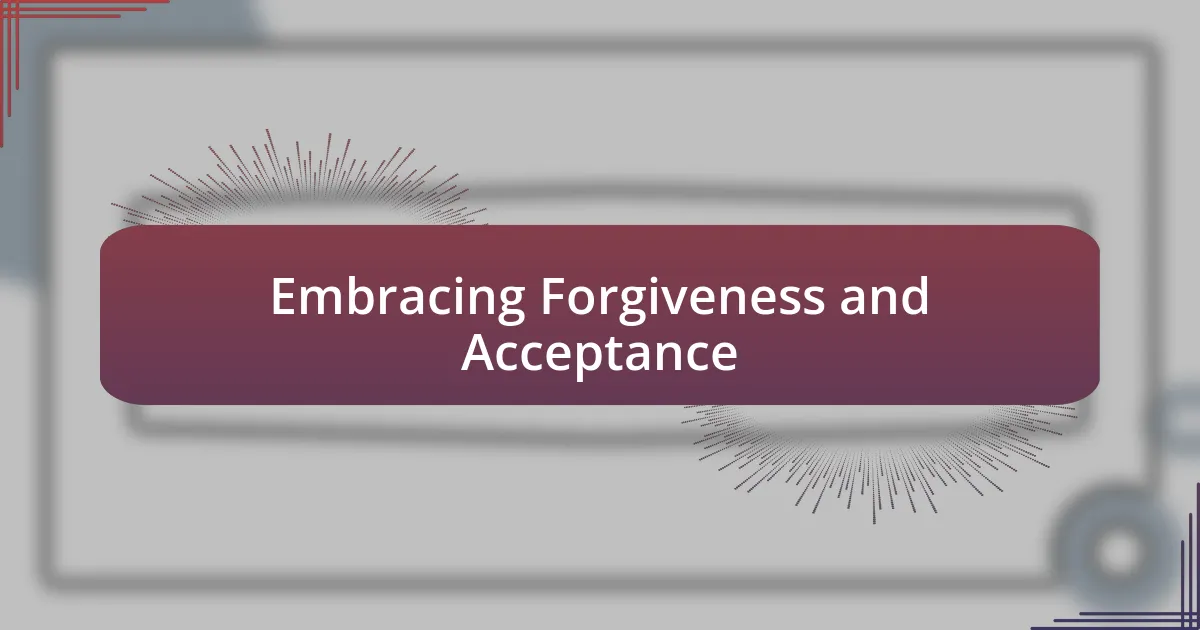
Embracing Forgiveness and Acceptance
Embracing forgiveness is a powerful step in letting go of regret. I remember a time when I held onto a grudge against a mentor who dismissed my ideas early in my career. It weighed heavily on me until I realized that holding onto that anger only kept me from growing. By forgiving my mentor, I freed myself to learn from that experience instead of letting it become a shadow over my progress.
Acceptance follows closely behind forgiveness. When I came to terms with my past decisions, I felt an unexpected sense of relief. It’s as if I had finally unburdened myself from the expectations I had placed on my journey. The question I often ask myself is, “What can I learn from this?” This mindset allows me to frame my experiences positively, transforming regret into a stepping stone rather than a stumbling block.
Ultimately, embracing both forgiveness and acceptance nurtures a mindset of resilience. I often reflect on how my past choices have led me to where I am now, and that realization fills me with gratitude. Being able to say, “That was then, and this is now,” has given me the strength to move forward with a clear heart and mind, ready to tackle whatever comes next.
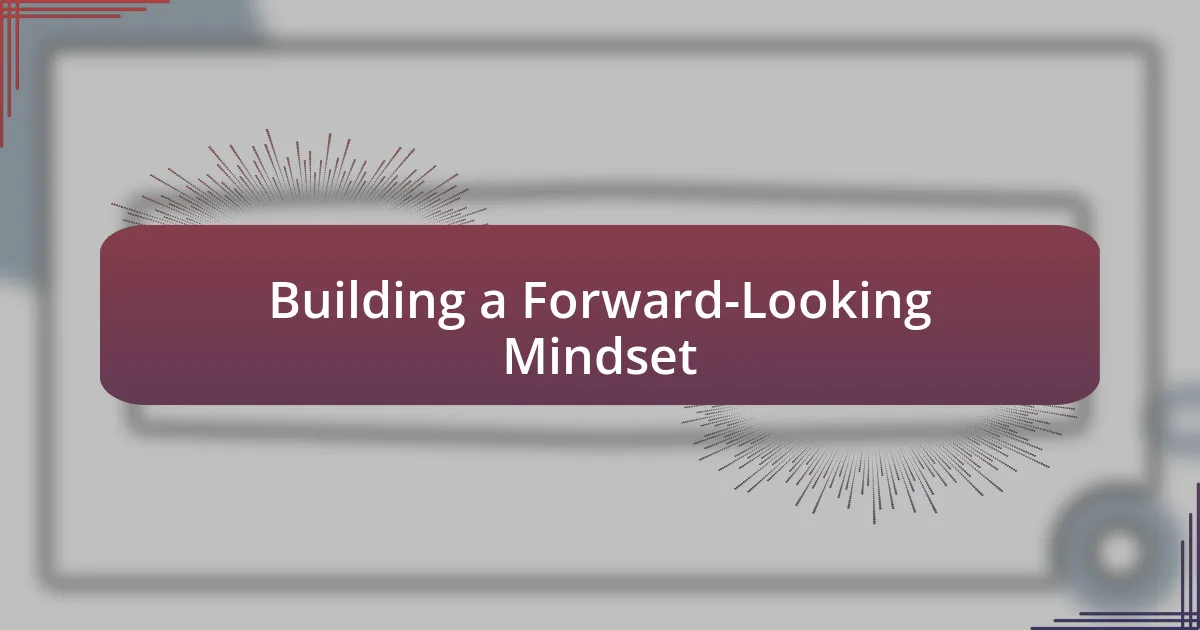
Building a Forward-Looking Mindset
Building a forward-looking mindset requires a conscious shift in perspective. I often recall the moment when I decided to stop seeing failures as roadblocks and to start viewing them as lessons. For instance, when I missed a significant deadline, it felt devastating at first. But then I asked myself, “What can I do differently next time?” This question transformed my entire approach to challenges.
I’ve learned that setting future-focused goals plays a crucial role in maintaining this mindset. For me, creating a vision board was a game changer. It visually represents my aspirations and reminds me to stay committed to my goals, even on days when self-doubt creeps in. I find it empowering to look at something tangible that illustrates the direction I want to go, aligning my actions with my long-term dreams.
Another important aspect is surrounding myself with positivity and support. Reflecting on my early days, I realized how much negative influences impacted my ability to move forward. Now, I consciously choose to engage with people who inspire and uplift me. It’s fascinating how a forward-looking mindset can be contagious within a supportive community. When I feel their energy, it reignites my passion and reminds me that the future holds endless possibilities.
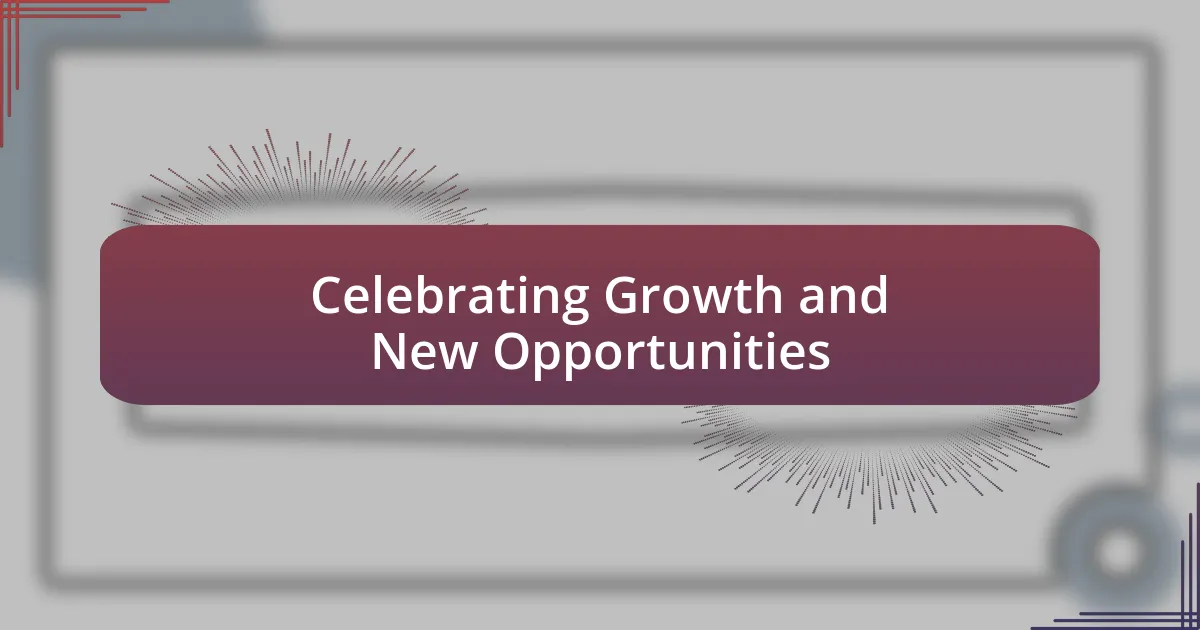
Celebrating Growth and New Opportunities
Embracing growth often feels like standing at the edge of a vast, unexplored landscape. I vividly remember the moment I landed a job that seemed out of reach at the time. I was terrified but exhilarated, realizing that each step I took led me to new opportunities I once thought impossible. How often do we sell ourselves short because of past regrets?
As I navigated my new role, I discovered the power of reflection. After a challenging project, I would sit down and jot down what I learned—not just about the task at hand, but about my capabilities. This practice turned moments of doubt into stepping stones for future endeavors. It hit me that growth isn’t just about achievements; it’s about recognizing the progress we make, no matter how small.
I’ve also come to cherish the joy of celebrating even the tiniest breakthroughs. When I finally tackled a fear of public speaking, I felt like I’d conquered a mountain. Each time I faced that fear and spoke up in meetings, I celebrated the triumph with a simple “well done” to myself. Don’t underestimate the power of recognizing growth—it’s often the fuel we need to open more doors to opportunities ahead.

